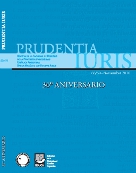Please use this identifier to cite or link to this item:
https://repositorio.uca.edu.ar/handle/123456789/2696| Título: | El matrimonio y la utopía de la neutralidad de género : reflexiones sobre facticidad, finitud y derecho positivo de familia | Autor: | Basset, Úrsula Cristina | Palabras clave: | Tomás de Aquino, Santo, 1225?-1274; GENERO; MATRIMONIO; FILOSOFIA DEL DERECHO; IUSNATURALISMO; CODIGO CIVIL; HOMOSEXUALIDAD | Fecha de publicación: | 2010 | Editorial: | EDUCA Universidad Católica Argentina. Facultad de Derecho |
Cita: | Basset, U. C. El matrimonio y la utopía de la neutralidad de género : reflexiones sobre facticidad, finitud y derecho positivo de familia [en línea], Prudentia Iuris. 2010, 68-69. Disponible en: https://repositorio.uca.edu.ar/handle/123456789/2696 | Resumen: | Resumen: La nueva modificación al Código Civil Argentino, que suprime la referencia a la distinción de sexos en el matrimonio, tiene implicancias que no sólo se proyectan sobre las prácticas sociales. Supone una posición iusfilosófica radical. Más profundamente, entraña una modificación cultural y simbólica, que probablemente incida en el patrimonio de las futuras generaciones. Aquí se analizan dos de los presupuestos teóricos que han presidido el debate y la aprobación del nuevo matrimonio: la negación de la dependencia del derecho tanto respecto de hechos, valores, normas y principios; y de la finitud del hombre en su condición de ser sexuado. El artículo concluye con un análisis en punto al final abierto que deja la deconstrucción y reconstrucción del matrimonio en el derecho positivo y en la posibilidad misma de que las generaciones futuras accedan al conocimiento de los principios de la ley natural. Abstract: The new amendment to the Argentinean Civil Code, which deleted every reference to sexual differences between men and women in the text of the new law of marriage, has consequences not only onto social practices; moreover it implies a radical iusphilosophical position. More profoundly, it entails a cultural and symbolic change, which will probably affect the epigenetic heritage of future generations. Here, we analyze two of the theoretical assumptions that have presided over the discussion and adoption of the new definition of marriage: (i) a denial of the dependence of law on facts, values, norms and principles; and (ii) an implicit denial of the finitude of the sexed condition of humanity. The article concludes with an analysis of the semantic deconstruction and reconstruction of marriage in positive law; which discloses an open end to the very possibility that future generations have access to the knowledge of the principles of natural law. |
Cobertura Espacial: | ARGENTINA | URI: | https://repositorio.uca.edu.ar/handle/123456789/2696 | Disciplina: | DERECHO | Derechos: | Acceso Abierto | Fuente: | Prudentia Iuris Nº 68/69, 2010 |
| Appears in Collections: | PI - 2010 nro. 68-69 |
Files in This Item:
| File | Description | Size | Format | |
|---|---|---|---|---|
| matrimonio-utopia-neutralidad-genero-basset.pdf | 216,55 kB | Adobe PDF |  View/Open |
Page view(s)
501
checked on Feb 18, 2026
Download(s)
151
checked on Feb 18, 2026
Google ScholarTM
Check
This item is licensed under a Creative Commons License

